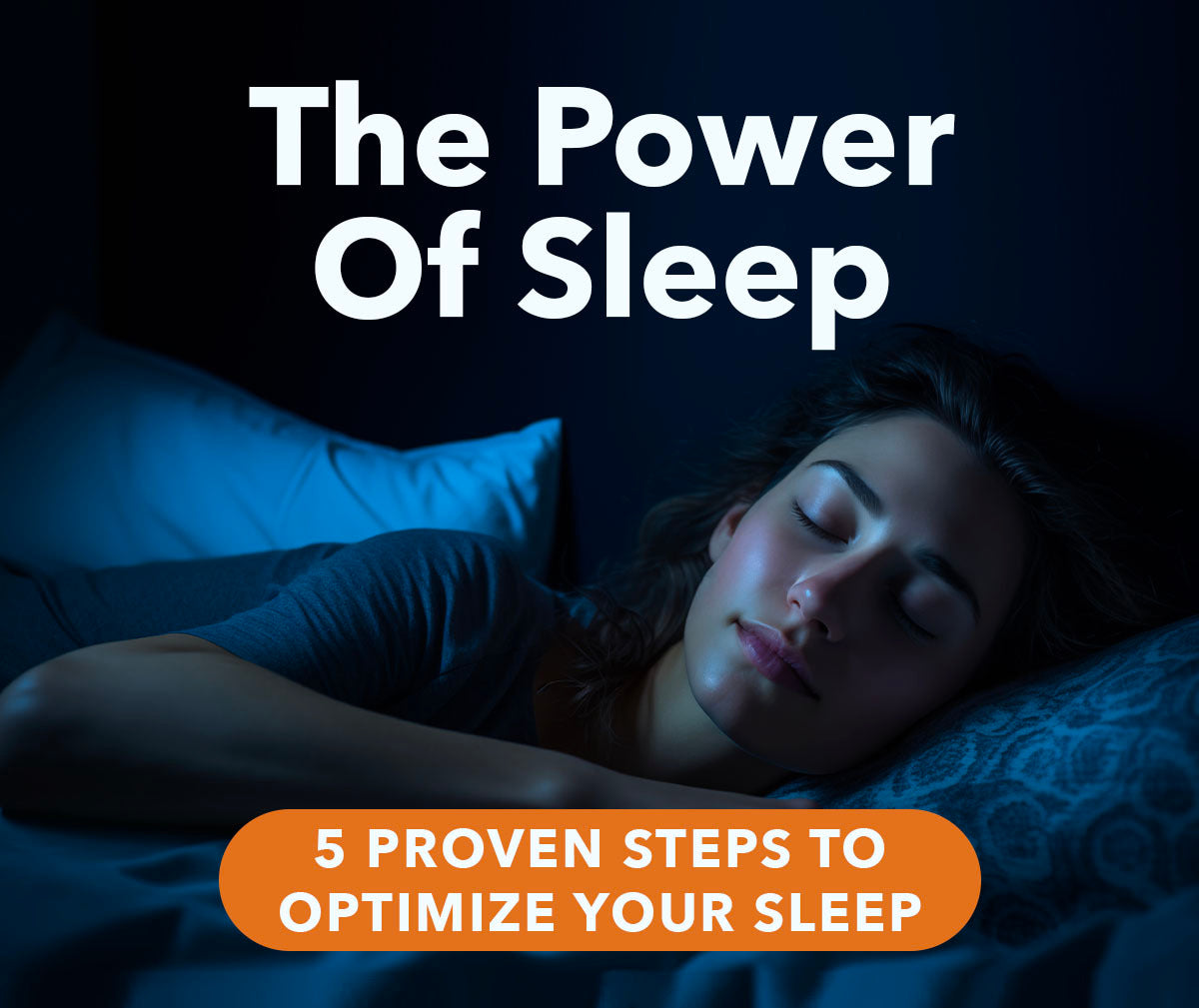5 Proven Steps to Optimize Your Sleep

We all know sleep is important. Everything is harder when we don't get a good night's sleep. We haven’t figured out yet all the reasons WHY we sleep, but we do know that a lack of sleep leads to problems.
There seems to be a delicate balance when it comes to sleep as too much or too little sleep isn’t good for us. Sleep deprivation blocks the proper functioning of your brain, thus changing how you see and interact with the world.
Since we spend about a third of our life asleep, it must be crucial. Every animal on earth needs sleep and it impacts our mood, hormones, immune system regulation, cognitive abilities and our longevity. Contrary to popular belief, sleep is a very active period for our body. There are quite a bit of activities going on during our down time.
The body does essentially two things during sleep:
1) It cleans up cellular debris, organic waste left over after a cell dies, which is an inevitable consequence of a cell life-cycle
2) It repairs/heals/grows. When you don’t get enough sleep, your brain stores metabolic byproducts like a pile of trash and it becomes harder to process information and your cognitive abilities decrease.
When we sleep, our brain volume shrinks to allow the drainage of cerebrospinal fluid and the debris and toxins it contains. This process is regulated by our glymphatic system to allow a continual cleaning of our nervous system. While your blood vessels bring oxygen and nutrients to your neurons, the glymphatic system clears the trash out.
During the day, your brain creates, reorganizes and gets rid of neural pathways. It happens every time you learn something new or repeat something you already knew how to do. Like other cells in your body, your neurons release waste products that need to be clean every day.
Sleep can be divided into 4 stages
- Stage 1: A transition phase between awake and asleep. It is essentially light sleep. Muscle spasms or jerking happens in this phase.
- Stage 2: Your brain waves slow down and your eyes stop moving. About half of our night happens in stage 2.
- Stage 3: Deep sleep. This is when your brain produces delta waves and where sleepwalking, bed wetting and night terrors occur.
- Stage 4: REM (rapid eye movement) sleep. Except for the muscles of your eyes, your whole body is paralyzed. Dreams happen in this stage.
A sleep cycle represents a period of about 90 minutes where you go through all the stages. Deep sleep tends to happen more in the first half of the night while REM sleep occurs mostly during the second half. As we age, our sleep duration and quality decrease.
There is no optimal amount of sleep but most experts recommend between 7 and 9 hours per night. Depending on the season, your sleep requirements will vary. In summer, where the sun is present for a longer period, it’s normal to require less sleep while the opposite is also true during winter.
But how does our brain know when it is time to sleep or the exact quantity of sleep we need?
1) Your Circadian rhythm
The circadian rhythm is a 24 hour cycle that creates physiological changes in your body.
Every single one of your cells possess a clock that is connected to the master clock in your brain.
When light hits your eyes, the suprachiasmatic nucleus (SCN) in the brain decipher the light frequencies to adjust the biological programming built in you to synchronize the sleep/wake cycle, weight loss/weight gain, detoxification, etc.
As weird as it may seem, the signals that run your daily cycle start in your eye and get converted into electrical impulses that run the body.
When you are living in nature, the spectrum of light changes constantly. Some wavelengths of light are present all the time (like infrared) and others aren’t (like UV or blue light). Blue light is present during the day but diminishes at sunset and is absent during the late evening and at night.
Your circadian rhythm is used to these spectrum changes and activates/deactivates certain cellular functions depending on the time of day it ‘’believes’’ to be.
When you are exposed to blue light or artificial light at night, your body believes that it's midday and thus can’t shift you in the proper setting for deep and restful sleep.
During the day, you need a higher cortisol level and lower melatonin levels to stay alert. When you are exposed to blue light at night, your body will then recreate these conditions to act accordingly.
This disrupts your ability to sleep well and compromises your ability to rest, repair and heal. One night of bad sleep or light exposure won’t affect you so much but chronic exposure to artificial light at night and poor sleep will take a significant toll on your health.
2) Your Sleep Hormone,Melatonin
Melatonin is often called the hormone of darkness but it is actually produced in response to sunlight.
It is the most potent antioxidant, anti-inflammatory and anti-cancer molecule your body produces.
When you expose yourself to natural sunlight during the day, your body will start to produce melatonin using two different mechanisms.
- The first one is using infrared light (IR). When IR (present in sunlight but absent from artificial light) hits your skin, it penetrates your body and activates the production of melatonin inside your mitochondria (the powerhouse of your cells).
- The second mechanism happens when UV light (also absent from artificial light) hits your eyes. It starts the production of melatonin in your pineal gland. This doesn’t work when you never go outside, since you never get access to UV light, or when you wear prescription glasses, contact lenses or sunglasses since they all block UV light.
Melatonin gets released into your bloodstream to induce sleep when the amount of blue light in your environment diminishes as it does in nature when the sun sets. This indicates to your nervous system that it’s time to wind down and sleep.
👉Two very important cellular programs work with melatonin:
-
The first one is autophagy, the recycling mechanism that allows your cells to reuse old parts to create new ones. Think of it as replacing old batteries in a remote control with new ones. When autophagy stops working, inflammation and degeneration occur. This mechanism is controlled mainly by infrared light.
-
The second mechanism is apoptosis, the pre programmed cell death. When a cell has taken too much damage and its behavior becomes erratic, specific signals will lead to its death to make sure it doesn’t replicate and create other abnormal cells. This ensures that your tissues remain healthy and when it stops working, cancer happens. Apoptosis is controlled by UV light.
👉Supplementing melatonin isn’t a good option because you lower your endogenous production:
Like all hormones in your body, melatonin production is controlled via a tight feedback loop. When you take it in a supplement form, you break that feedback loop. Maintaining optimal melatonin levels is possible when you live in an environment that is consciously designed and represents what we have evolved with.
👉Artificial light at night will destroy your melatonin levels and rob you of its numerous benefits:
As you can see in the picture below, the higher your light environment is in blue and green light, the more your melatonin levels will decrease.

5 steps to improve your sleep
Here are some quick and easy ways to improve your sleep by altering the signals from your environment to your circadian rhythm.
-
See the sunrise every morning
Exposing yourself to natural light in the morning will create an adequate cortisol awakening response (CAR).
The CAR is responsible for creating a spike of cortisol to wake you up and get you moving.
It also tells your brain to stop releasing melatonin and start producing some in reserve for the following night.
The CAR is very important for the regulation of the immune system and has been shown to improve auto-immune disease symptoms.
The greater your CAR is, the easier it will be to lower your cortisol at night to ensure a peaceful and restful sleep.
-
Wear Circadian Lenses
Vivarays Circadian Lenses are designed to transform your light environment and optimize your health.
Much more than regular blue light blocking glasses, they are designed to fit specific periods of the day to make sure that you are exposed to the right type of light at the right time by blocking the wavelengths of light that aren’t present in nature.
Wearing these glasses especially in the evening and at night when you are exposed to artificial light will ensure that you maintain healthy levels of melatonin and benefit from its potent health enhancing effects.
-
Stop eating 3-4 hours before going to bed
Aside from the light and dark cycles, the timing of your meals is the other important factor that regulates your circadian rhythm.
Eating too close to bedtime is detrimental to your sleep. We are diurnal animals and we evolved moving around and living during the day.
Eating late at night will postpone your circadian rhythm making it harder for you to fall asleep at an adequate time and the variation of insulin level after a rich meal will increase the risk of waking up during the night.
-
Sleep in a cold and dark environment
Our temperature naturally decreases during the night because our metabolism slows down. If you sleep in a room that’s too hot or under multiple blankets, chances are your temperature will increase making it harder to achieve deep sleep.
Being exposed to colder temperatures at night also increases your growth hormone production. Also called the fountain of youth, this hormone helps you lose fat, increases bones and muscle mass, sleeps deeper and keeps your skin and hair looking young and healthy.
The darker your room is, the deeper you’ll sleep. Studies have shown that even a small source of light like an alarm clock has the ability to lower your sleep quality. If you can’t sleep in a completely dark room, wearing an eye mask is the second best option.
-
Keep a consistent sleep schedule & routine
Your body synchronizes its function based on internal and external signals. Most parents know that keeping a regular sleep schedule and routine is important for babies and toddlers. The same is true for adults. The more consistent you are with what you do before sleep and with the timing of your bedtime and wake up time, the better you’ll sleep.
Make sure to do calming activities before bedtime like meditation, reading, taking a warm bath to cue your nervous system that it’s time for relaxation. Watching action movies or doing high intensity activities will increase your stress hormones and make it harder for you to wind down.
To optimize your sleep, you need to respect the light and dark cycle present in nature. That’s what your body needs and is accustomed to.
That means going outside in the sun during the day and avoiding artificial light and sleeping in a dark environment. Since it impacts not only every function of your body but also how you show up in the world, it is worth making the most of it.




Leave a comment